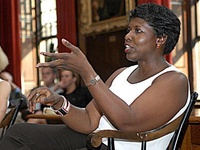Harvard College Democrats President Andrew J. Frank ’05 said the positive results for his party are indicative of Kerry’s campaigning efforts.
“We’ve known for a while that Bush is not popular. His approval ratings have dropped below 50 percent,” Frank said. “[Voters] may not be completely enthusiastic about Kerry, but he may have relieved a lot of their fears.”
But King cautioned that the results are not as positive for Kerry as the 20-point margin might seem to indicate.
“If I were John Kerry, I wouldn’t take a whole lot of comfort in these poll results,” King said. “The students appear to be pretty fickle—20 percent have changed their minds over the past five months, and most of them are with Kerry because they don’t like Bush.”
Chair of the IOP survey committee Jonathan S. Chavez ’05 said the survey might not be as accurately representative of the national collegiate population as the March IOP poll because of the decreased sample size.
Half of the surveyed students said Kerry addressed issues they cared about, whereas only 26 percent felt that way about Bush—a result that King said puzzled him.
“It hasn’t seemed to me that either candidate has done an especially effective job reaching out to younger people, and both tend to speak about the same issues,” King said.
Truesdell cited what she said were historical patterns of college students being more liberal than the rest of the population as driving the perception of Bush’s inattention to young voters.
“I think the Bush campaign probably knows they are weaker in the college student demographic than they are perhaps in other demographics,” Truesdell said.
But Truesdell added that she did not expect such a big gap between the candidates on the topic of issues.
“I’m surprised because Bush has been talking about issues that matter to students—especially the economy, which is in a great recovery right now,” Truesdell said. “[Respondents] might have interpreted the question as which candidate is talking about the issues in a way that they like, since both candidates are talking about the same issues.”
Chavez said he was not surprised by the perception that Kerry paid more attention to students than Bush.
“Bush is not caring about this generation and is not talking about the issues students care about,” Chavez said. “Simply put, Kerry is.”
The poll may have shown somewhat inflated results for Democrats because independent voters—who King said are easily swayed—might have been influenced by increased media attention to the Kerry camp after Sen. John R. Edwards, D-N.C., was chosen as the vice-presidential candidate.
Three-quarters of the poll respondents—5 percent more than in the March poll—said they will “definitely be voting” in November.
Frank said the high results were an indication of a highly polarized country.
But Truesdell said she was skeptical about the high voting rate.
“Everyone says they have the intention of voting, but when it comes down to it, probably 40 percent or less will wind up voting,” Truesdell said. “You know how college students are.”
—Staff writer Alan J. Tabak can be reached at tabak@fas.harvard.edu.









